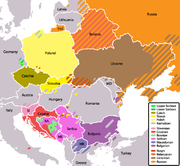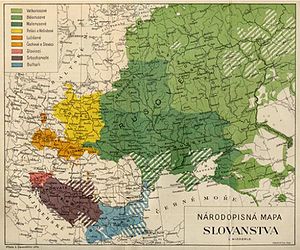
Russian proverbs
Quotations
Not an actual proverb, but quotes from Krylov's parables![]()
Алты́нного во́ра ве́шают, а полти́нного че́ствуют.![]()
Transliteration: Altynnovo vora veshayut, a poltinnovo chestvuyut.
Encyclopedia
Russian language proverbs are words of wisdom created in Slavic languages
by Slavic peoples
. The proverbs originated from oral history
and ancient written texts dating as far back as the 12th century. The Russian language
is replete with many hundreds of proverb
s (пословица pɐˈslovʲɪtsə) and saying
s (поговоркa pəɡɐˈvorkə).
The proverbs
express a universal concept, have a moral
lesson and provide an insight into many aspects of history
, culture
, and national character
of the people who created them. By the 17th century, the proverbs were collected and documented. They were studied in the 19th and 20th centuries. Vladimir Dal
was a famous lexicographer of the Russian Empire
whose collection was published in Russian language
in the late 19th century as The Sayings and Bywords of the Russian People, featuring more than 30,000 entries. They continue to endure in modern literature
and folklore
.


in the 18th century in Eastern Europe
, when it finally displaced Church Slavonic language. Russian language proverbs were first collected and documented during the Russian Empire
from the oral history of many different cultures and nationalities.
The Russian Empire
included parts of:
 Russia
Russia  Poland
Poland  Finland
Finland  Estonia
Estonia  Latvia
Latvia  Lithuania
Lithuania  Belarus
Belarus  Moldova
Moldova  Ukraine
Ukraine  Georgia (country)
Georgia (country)  Armenia
Armenia  Azerbaijan
Azerbaijan  Kazakhstan
Kazakhstan  Uzbekistan
Uzbekistan  Turkmenistan
Turkmenistan  Kyrgyzstan
Kyrgyzstan  Tajikistan
Tajikistan
Under the unification of the Soviet Union
from 1922 to 1991, Russian language
continued to be the official and dominant language, displacing the languages of the fifteen Republics of the Soviet Union
. Today, the Commonwealth of Independent States
continues to use Russian language
as their working language
.
Slavic languages
The Slavic languages , a group of closely related languages of the Slavic peoples and a subgroup of Indo-European languages, have speakers in most of Eastern Europe, in much of the Balkans, in parts of Central Europe, and in the northern part of Asia.-Branches:Scholars traditionally divide Slavic...
by Slavic peoples
Slavic peoples
The Slavic people are an Indo-European panethnicity living in Eastern Europe, Southeast Europe, North Asia and Central Asia. The term Slavic represents a broad ethno-linguistic group of people, who speak languages belonging to the Slavic language family and share, to varying degrees, certain...
. The proverbs originated from oral history
Oral history
Oral history is the collection and study of historical information about individuals, families, important events, or everyday life using audiotapes, videotapes, or transcriptions of planned interviews...
and ancient written texts dating as far back as the 12th century. The Russian language
Russian language
Russian is a Slavic language used primarily in Russia, Belarus, Uzbekistan, Kazakhstan, Tajikistan and Kyrgyzstan. It is an unofficial but widely spoken language in Ukraine, Moldova, Latvia, Turkmenistan and Estonia and, to a lesser extent, the other countries that were once constituent republics...
is replete with many hundreds of proverb
Proverb
A proverb is a simple and concrete saying popularly known and repeated, which expresses a truth, based on common sense or the practical experience of humanity. They are often metaphorical. A proverb that describes a basic rule of conduct may also be known as a maxim...
s (пословица pɐˈslovʲɪtsə) and saying
Saying
A saying is something that is said, notable in one respect or another, to be "a pithy expression of wisdom or truth."There are a number of specific types of saying:...
s (поговоркa pəɡɐˈvorkə).
The proverbs
Proverbs
Proverbs may refer to:*The plural of the word proverb*The Book of Proverbs, one of the books of the Hebrew Bible*Roy Proverbs, English footballer...
express a universal concept, have a moral
Moral
A moral is a message conveyed or a lesson to be learned from a story or event. The moral may be left to the hearer, reader or viewer to determine for themselves, or may be explicitly encapsulated in a maxim...
lesson and provide an insight into many aspects of history
History
History is the discovery, collection, organization, and presentation of information about past events. History can also mean the period of time after writing was invented. Scholars who write about history are called historians...
, culture
Culture
Culture is a term that has many different inter-related meanings. For example, in 1952, Alfred Kroeber and Clyde Kluckhohn compiled a list of 164 definitions of "culture" in Culture: A Critical Review of Concepts and Definitions...
, and national character
Moral character
Moral character or character is an evaluation of a particular individual's durable moral qualities. The concept of character can imply a variety of attributes including the existence or lack of virtues such as integrity, courage, fortitude, honesty, and loyalty, or of good behaviors or habits...
of the people who created them. By the 17th century, the proverbs were collected and documented. They were studied in the 19th and 20th centuries. Vladimir Dal
Vladimir Dal
Vladimir Ivanovich Dal was one of the greatest Russian language lexicographers. He was a founding member of the Russian Geographical Society. He knew at least six languages including Turkic and is considered to be one of the early Turkologists...
was a famous lexicographer of the Russian Empire
Russian Empire
The Russian Empire was a state that existed from 1721 until the Russian Revolution of 1917. It was the successor to the Tsardom of Russia and the predecessor of the Soviet Union...
whose collection was published in Russian language
Russian language
Russian is a Slavic language used primarily in Russia, Belarus, Uzbekistan, Kazakhstan, Tajikistan and Kyrgyzstan. It is an unofficial but widely spoken language in Ukraine, Moldova, Latvia, Turkmenistan and Estonia and, to a lesser extent, the other countries that were once constituent republics...
in the late 19th century as The Sayings and Bywords of the Russian People, featuring more than 30,000 entries. They continue to endure in modern literature
Modern literature
Modern literature can either refer to*modernist literature *modern literature ....
and folklore
Folklore
Folklore consists of legends, music, oral history, proverbs, jokes, popular beliefs, fairy tales and customs that are the traditions of a culture, subculture, or group. It is also the set of practices through which those expressive genres are shared. The study of folklore is sometimes called...
.


Origin of Russian language proverbs
Russian became a full-fledged literary languageLiterary language
A literary language is a register of a language that is used in literary writing. This may also include liturgical writing. The difference between literary and non-literary forms is more marked in some languages than in others...
in the 18th century in Eastern Europe
Eastern Europe
Eastern Europe is the eastern part of Europe. The term has widely disparate geopolitical, geographical, cultural and socioeconomic readings, which makes it highly context-dependent and even volatile, and there are "almost as many definitions of Eastern Europe as there are scholars of the region"...
, when it finally displaced Church Slavonic language. Russian language proverbs were first collected and documented during the Russian Empire
Russian Empire
The Russian Empire was a state that existed from 1721 until the Russian Revolution of 1917. It was the successor to the Tsardom of Russia and the predecessor of the Soviet Union...
from the oral history of many different cultures and nationalities.
The Russian Empire
Russian Empire
The Russian Empire was a state that existed from 1721 until the Russian Revolution of 1917. It was the successor to the Tsardom of Russia and the predecessor of the Soviet Union...
included parts of:
 Russia
Russia  Poland
Poland  Finland
Finland  Estonia
Estonia  Latvia
Latvia  Lithuania
Lithuania  Belarus
Belarus  Moldova
Moldova  Ukraine
Ukraine  Georgia (country)
Georgia (country)  Armenia
Armenia  Azerbaijan
Azerbaijan  Kazakhstan
Kazakhstan  Uzbekistan
Uzbekistan  Turkmenistan
Turkmenistan  Kyrgyzstan
Kyrgyzstan  Tajikistan
Tajikistan Under the unification of the Soviet Union
Soviet Union
The Soviet Union , officially the Union of Soviet Socialist Republics , was a constitutionally socialist state that existed in Eurasia between 1922 and 1991....
from 1922 to 1991, Russian language
Russian language
Russian is a Slavic language used primarily in Russia, Belarus, Uzbekistan, Kazakhstan, Tajikistan and Kyrgyzstan. It is an unofficial but widely spoken language in Ukraine, Moldova, Latvia, Turkmenistan and Estonia and, to a lesser extent, the other countries that were once constituent republics...
continued to be the official and dominant language, displacing the languages of the fifteen Republics of the Soviet Union
Republics of the Soviet Union
The Republics of the Soviet Union or the Union Republics of the Soviet Union were ethnically-based administrative units that were subordinated directly to the Government of the Soviet Union...
. Today, the Commonwealth of Independent States
Commonwealth of Independent States
The Commonwealth of Independent States is a regional organization whose participating countries are former Soviet Republics, formed during the breakup of the Soviet Union....
continues to use Russian language
Russian language
Russian is a Slavic language used primarily in Russia, Belarus, Uzbekistan, Kazakhstan, Tajikistan and Kyrgyzstan. It is an unofficial but widely spoken language in Ukraine, Moldova, Latvia, Turkmenistan and Estonia and, to a lesser extent, the other countries that were once constituent republics...
as their working language
Working language
A working language is a language that is given a unique legal status in a supra-national company, society, state or other body or organization as its primary mean of communication...
.
See also
- List of Russian proverbs on WikiquoteWikiquoteWikiquote is one of a family of wiki-based projects run by the Wikimedia Foundation, running on MediaWiki software. Based on an idea by Daniel Alston and implemented by Brion Vibber, the goal of the project is to produce collaboratively a vast reference of quotations from prominent people, books,...
Russian Proverbs - List of Russian proverbs on WiktionaryWiktionaryWiktionary is a multilingual, web-based project to create a free content dictionary, available in 158 languages...
Russian Proverbs - Russian sayingsRussian sayingsRussian sayings give an insight into many aspects of Russian history, culture, and national character. The Russian language is replete with many hundreds of proverbs and sayings . These were already tabulated by the seventeenth century, and collected and studied in the nineteenth and twentieth,...
- Vladimir DalVladimir DalVladimir Ivanovich Dal was one of the greatest Russian language lexicographers. He was a founding member of the Russian Geographical Society. He knew at least six languages including Turkic and is considered to be one of the early Turkologists...

